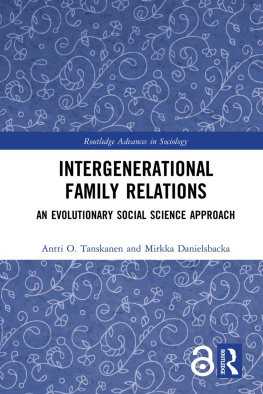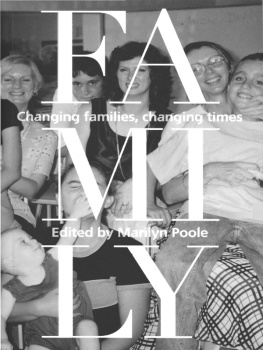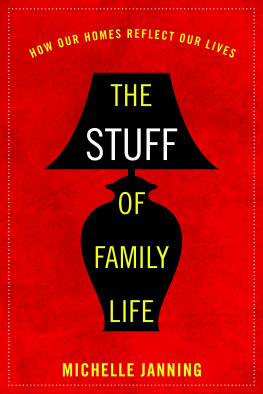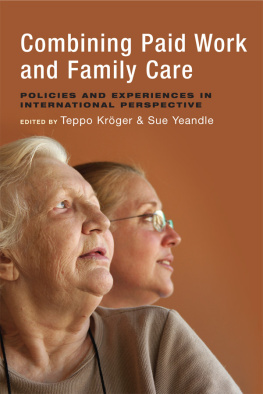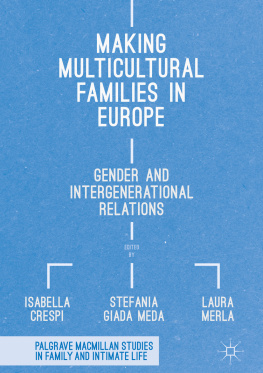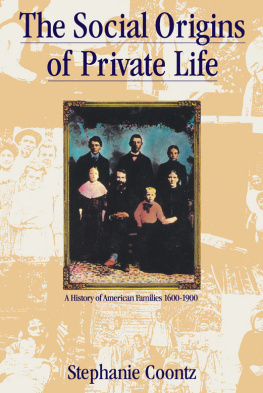CONTINUING TO CARE
ISSUES IN AGING
VOLUME II
GARLAND REFERENCE LIBRARY OF SOCIAL SCIENCE
VOLUME II73
CONTINUING
TO CARE
OLDER AMERICANS AND
THEIR FAMILIES
KAREN A. CONNER, PH.D.
FALMER PRESS
A MEMBER OF THE TAYLOR & FRANCIS GROUP
NEW YORK & LONDON
2000
Published in 2000 by
Falmer Press
A member of the Taylor & Francis Group
29 West 35th Street
New York, NY 10001
Copyright 2000 by Karen A. Conner
All rights reserved. No part of this book may be reprinted or reproduced or utilized in any form or by any electronic, mechanical, or other means, now known or hereafter invented, including photocopying and recording, or in any information storage or retrieval system, without permission in writing from the publisher.
10 9 8 7 6 5 4 3 2 1
Library of Congress Cataloging-in-Publication Data
Conner, Karen Ann, 1946
Continuing to care : older Americans and their families /
Karen A. Conner.
p. cm. (Issues in aging ; vol. 11) (Garland reference library of social
science ; vol. 1173)
Includes bibliographical references and index.
ISBN 0-8153-2889-3 (alk. paper)
1. AgedHome careUnited StatesForecasting. 2. AgedUnited
StatesFamily relationshipsForecasting. 3. CaregiversUnited States Social conditionsForecasting. 4. Intergenerational relationsUnited StatesForecasting. 5. Age distribution (Demography)United States Forecasting. I. Title. II. Series : Garland reference library of social science ; v. 1173. III. Series : Garland reference library of social science. Issues in aging ; v. 11.
HV1461.C666 1999
| 362.6'0973dc21 | 99-37922
CIP |
Printed on acid-free, 250-year-life paper.
Manufactured in the United States of America
To gary gerlach
Contents
Series Editor's Foreword
This series attempts to address the topic of aging from a wide variety of perspectives and to make available some of the best gerontological thought and writings to researchers, professional practitioners, and students in the field of aging as well as in other related areas. All the volumes in the series are written and/or edited by outstanding scholars and leading specialists on current issues of considerable interest.
This scholarly, well-written book not only makes a valuable contribution to the gerontological literature, but also becomes especially important by focusing on how the caregiving obligations of the family are increasing with the growing number of the oldest old. Yet, at the same time, the changing American family patterns which include an increase in single parent and blended families pose obstacles to family care. The author examines this dilemma in depth and offers some creative and intriguing approaches toward dealing with it.
Diana K. Harris
The University of Tennessee
Preface
In 1992, when I finished writing Aging America: Issues Facing an Aging Society, it seemed clear to me that the single most important issue facing the United States in the next decades was the continuation of our family support system for older, frail family members. Shifting away from family based care would be far too costly for a country facing serious challenges to the economic viability of its Social Security and Medicare programs. More important, however, a move away from care provided by family members and friends toward care delivered by strangers would forever change the nature of the relationship between generations in America. As members of different generations, we would no longer be in it together but rather we would become serious competitors in a race to secure for ourselves the scarce resources belonging to our families and our society. The act of caring for another would become a burden to dispatch and delegate as efficiently as possible rather than an exchange that reinforces shared bonds of obligation and responsibility.
Writing Aging America left me with questions about America's families. What do families do for their older members? How do they do it? What burdens do they confront as they provide care to the frail, sick, and dying? What barriers do they encounter as they try to do their duty? How can we best support them in their work? And, what will we do if families do not continue to provide care? This book, Continuing to Care, provides some answers to these questions. Continuing to Care also challenges all of us to recognize and appreciate what is done in private by America's strong families who are continuing the tradition of care for others.
Books are always products of what we learn and absorb from other people. I have learned first hand about family caregiving from my husband, Gary Gerlach, and our wonderful combined families of parents, grandparents, aunts, uncles, and cousins. I have been privileged to teach at Drake University where I have been supported by my colleagues and enriched by my work with students. The students in the Aging Studies Program at Drake University are among the finest people I know. They are preparing for careers that will place them on the front lines, providing care to other people. They are generous, unselfish, positive people who will contribute to America's future. It has been an honor and great joy to work with them and follow their careers.
Finally, a special thank you is extended to series editor Diana Harris for her encouragement and patience and to the editorial staff at Garland Publishing for their dedication to the great profession of publishing.
CONTINUING TO CARE
CHAPTER 1
Continuing to Care?
Aging American Families
As Americans prepare for the 21st century, two long-term social trends are converging. American society as a whole is aging as a growing number and proportion of individual Americans reach advanced old age. At the same time, our families are changing in ways that may make it increasingly difficult to continue to provide care for older family members. These changes include the increased prevalence of divorce and remarriage, changing gender roles, and the explosive increase in single-parent families. As population aging expands the number of people who may become frail and dependent in old age, questions arise concerning the ability of the modern family to provide care for older members. Will the changing American family continue to provide this care, or will historical patterns of family-based care change as older people increasingly turn to strangers for care in the last years of life?
An aging population may place a tremendous burden on the resources of America's families. This increase in the potential burden of care comes at a time when the American family system is changing. Many experts argue that America's families are in a state of decline. These experts say that the contemporary family in the United States is poorly equipped to care for its children. If these experts are correct, how will the family address the potential increase in older family members' need for care and assistance? Changing family forms and purpose, combined with an increase in the number of older family members, may detract from the family's ability to continue to meet many of its traditional obligations and responsibilities to the elderly.
The burden of family-based care for the elderly is not going to diminish in the 21st century. We know it will increase. We know that the aging of American society will inevitably result in a dramatic increase in the number of people who will require their family's care. Furthermore, in many cases, care will be needed for several years and will require a heavy investment of time and energy from the caregiver. Research and anecdotal evidence have clearly revealed that the burden of elder caregiving on America's families is already great. How will our families respond to the inevitable increase in their caregiving obligations? How will change in the American family affect its ability to meet parent care demands? Will families continue to provide care? What if they do not?


